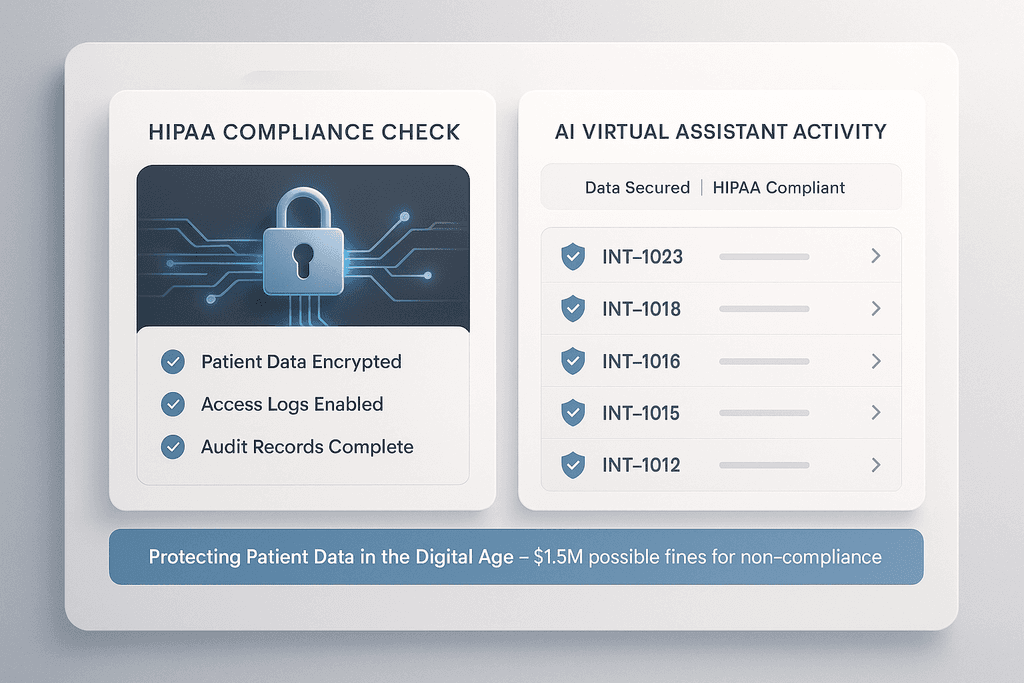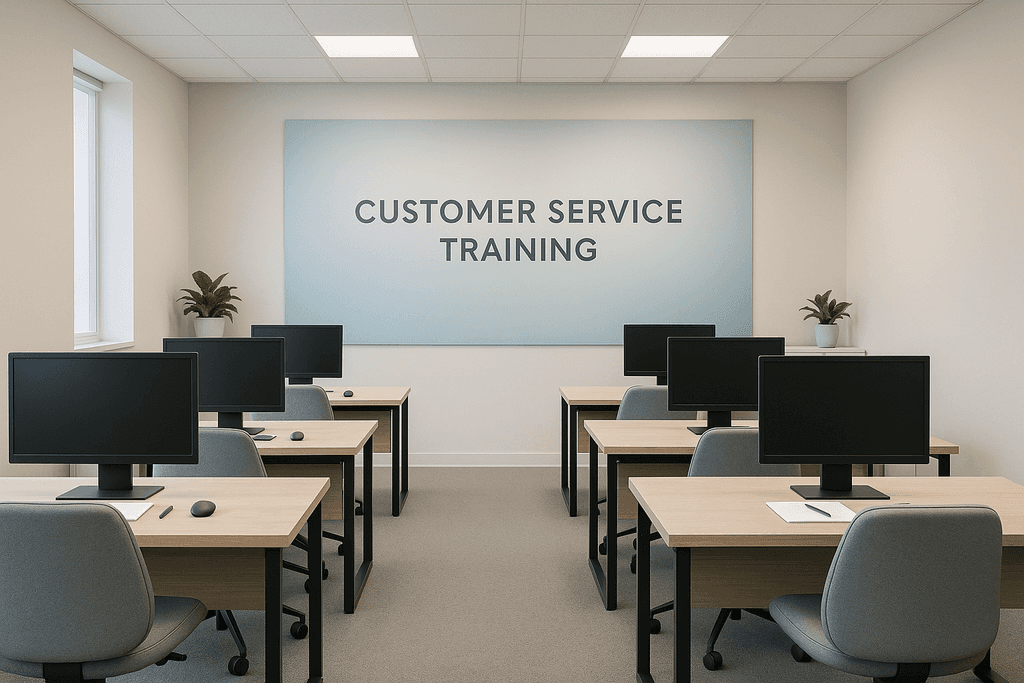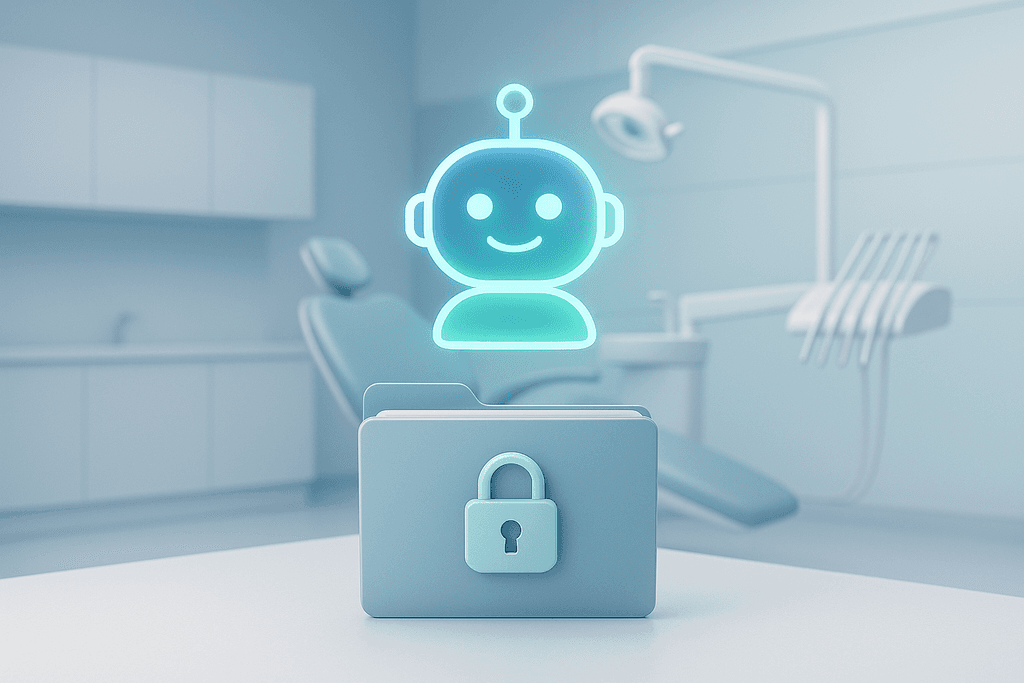Dental practices are increasingly turning to AI-powered chatbots to streamline patient communication and boost efficiency. These virtual assistants can handle everything from appointment scheduling to answering common questions, freeing up staff time for more complex tasks. However, as practices adopt this technology, ensuring HIPAA compliance becomes crucial to protect sensitive patient information and maintain trust.
Table of Contents
Understanding HIPAA in the Digital Age
Did you know that dental practices face fines up to $1.5 million per year for HIPAA violations? As technology evolves, so do the challenges of protecting patient data. Dental offices are increasingly adopting digital tools to improve patient care and streamline operations. But with great tech comes great responsibility.

HIPAA, or the Health Insurance Portability and Accountability Act, sets the rules for safeguarding medical information. For dental practices, this means protecting everything from patient records to appointment details. Let’s break down what HIPAA compliance looks like in a modern dental office:
- Secure electronic health records
- Encrypted communication channels
- Regular staff training on data protection
- Strict access controls for patient information
The digital age has brought new risks to patient privacy. Cyber attacks, data breaches, and even innocent mistakes can lead to serious consequences. Here are some common HIPAA pitfalls in dental practices:
- Unsecured Wi-Fi networks
- Sharing patient info over text or email
- Outdated software without security patches
- Lack of data backup and recovery plans
Maintaining HIPAA compliance isn’t just about avoiding fines. It’s about building trust with patients. When people know their sensitive information is safe, they’re more likely to seek regular dental care. This is where technology like HIPAA-compliant dental bots can make a difference.
These AI assistants can handle patient inquiries and scheduling while keeping data secure. For example, our OnCall Bot uses advanced encryption to protect all patient interactions. It’s designed to meet HIPAA standards without sacrificing convenience.
| HIPAA Violation | Potential Fine |
|---|---|
| Accidental | $100 – $50,000 |
| Willful Neglect (Corrected) | $10,000 – $50,000 |
| Willful Neglect (Uncorrected) | $50,000+ |
As dental practices navigate the digital landscape, understanding HIPAA is crucial. It’s not just about following rules—it’s about providing the best, most secure care possible. With the right tools and knowledge, dental offices can embrace technology while keeping patient data safe and sound.
For more insights on maintaining HIPAA compliance in dental software, check out this helpful guide on best practices from DentalEMR.
Key Features of HIPAA-Compliant Dental Bots
Dental practices looking to modernize their patient communication need to be aware of the essential features that make a dental bot HIPAA-compliant. These AI assistants can streamline operations, but only if they meet strict data protection standards.
Here are the key capabilities to look for:
- Encryption and secure data transmission
- User authentication and access controls
- Audit trails and logging capabilities
- Data storage and retention policies
- Integration with existing practice management systems
Encryption is crucial for protecting patient information as it moves between systems. Without it, sensitive data could be intercepted by malicious actors. Similarly, robust user authentication ensures only authorized staff can access patient records through the bot.
Audit trails may seem boring, but they’re a lifesaver if you ever need to investigate a potential data breach. They create a detailed record of who accessed what information and when.
Benefits of Implementing HIPAA-Compliant Chatbots
Now that we’ve covered the must-have features, let’s look at why dental practices are adopting these AI assistants:
- 24/7 patient communication and appointment scheduling
- Reduced administrative workload for staff
- Improved patient engagement and satisfaction
- Consistent and accurate information delivery
- Enhanced data collection and analysis capabilities
The ability to handle patient inquiries around the clock is a game-changer for many practices. It’s like having a tireless receptionist who never needs a coffee break.
But the benefits go beyond just convenience. These bots can significantly reduce the administrative burden on your team. Instead of spending hours on the phone answering the same questions, staff can focus on more complex tasks that require a human touch.
Implementing HIPAA-Compliant Bots in Your Practice
Ready to bring an AI assistant into your dental practice? Here’s a quick guide to get you started:
| Step | Description |
|---|---|
| 1. Assess needs | Identify your practice’s specific requirements and goals |
| 2. Evaluate vendors | Check potential providers’ HIPAA compliance credentials |
| 3. Train staff | Prepare your team for the new technology |
| 4. Customize bot | Tailor responses and workflows to your practice |
| 5. Monitor and optimize | Continuously improve based on performance data |
When assessing your needs, think about the most common patient inquiries you receive. These are prime candidates for automation. Our product, The OnCall Bot, is designed to handle a wide range of dental-specific questions and tasks.
Staff training is often overlooked, but it’s crucial for successful implementation. Make sure your team understands how to work alongside the AI assistant and when to step in for more complex issues.
Remember, implementing a chatbot isn’t a set-it-and-forget-it process. Regular monitoring and tweaking are essential to ensure it continues to meet your practice’s needs and HIPAA requirements.
For more information on HIPAA compliance in dental practices, check out this article on common HIPAA considerations for dental startups.
By carefully selecting and implementing a HIPAA-compliant dental bot, practices can enhance patient care, streamline operations, and stay on the right side of data protection regulations. It’s a powerful tool that, when used correctly, can take your practice to the next level of efficiency and patient satisfaction.

Overcoming Challenges and Ensuring Success
Implementing HIPAA-compliant dental bots presents both opportunities and hurdles for practices. Let’s analyze the key challenges and strategies for success:
Addressing Patient Concerns
Many patients may feel uneasy about AI handling their sensitive health information. To build trust:
- Educate patients on the bot’s security measures
- Offer opt-out options for those who prefer human interaction
- Clearly explain how data is used and protected
Transparency is crucial. Practices should have clear policies on data handling and be prepared to answer patient questions.
Balancing Automation and Human Touch
While bots can handle many tasks, maintaining a personal connection is vital in healthcare. Consider:
- Using bots for initial triage and basic inquiries
- Having human staff review bot interactions regularly
- Implementing seamless handoffs to human staff when needed
The OnCall Bot, for example, provides detailed transcripts that allow staff to follow up personally on complex issues.
Staying HIPAA Compliant
HIPAA regulations evolve, and practices must stay current. Key steps include:
- Regular staff training on HIPAA rules
- Periodic audits of bot interactions for compliance
- Partnering with vendors who prioritize ongoing HIPAA adherence
As noted by mConsent, maintaining HIPAA compliance is an ongoing process that requires vigilance.
Measuring ROI and Adjusting Strategy
To ensure bots are truly benefiting your practice:
- Track key metrics like patient satisfaction and staff time saved
- Gather feedback from both patients and staff regularly
- Be willing to adjust bot settings or usage based on results
Remember, the goal is to enhance patient care and practice efficiency. Regular assessment helps ensure your bot implementation aligns with these objectives.
By addressing these challenges thoughtfully, dental practices can harness the power of HIPAA-compliant bots to improve patient care and operational efficiency. The key is to approach implementation strategically, always keeping patient trust and quality care at the forefront.
Wrap-up
As dental practices navigate the world of AI and automation, HIPAA compliance remains crucial. Choosing the right HIPAA-compliant dental bot can streamline operations and improve patient care without compromising sensitive information. The OnCall Bot, for example, offers features like 24/7 availability and personalized responses while maintaining strict data protection standards.
Implementing a dental bot isn’t just about efficiency – it’s about enhancing the patient experience. With tools that can handle appointment requests and answer common questions, staff can focus on more complex tasks. This shift allows practices to provide better, more personalized care.
Looking ahead, we can expect AI in dentistry to become even more sophisticated. Future developments may include multilingual support and integration with other practice management tools. As these technologies evolve, staying informed about AI call automation and HIPAA requirements will be key for dental practices aiming to stay competitive and compliant.
Ready to explore how a HIPAA-compliant dental bot could benefit your practice? Check out our pricing options or contact us to learn more about getting started.
Common Questions About HIPAA-Compliant Dental Bots
How much do HIPAA-compliant dental bots cost?
Costs vary, but many providers offer affordable options for small practices. Monthly fees typically range from $50-$200, with some requiring a one-time setup fee. The OnCall Bot, for example, charges a $495 setup fee and $49.99 monthly, which includes unlimited patient interactions.
Can dental bots work with my existing patient management system?
Most HIPAA-compliant dental bots are designed to integrate smoothly with common practice management software. They often use secure APIs to connect with your existing systems, allowing for seamless data exchange without disrupting your current workflows.
How do dental bots protect sensitive patient information?
HIPAA-compliant dental bots use encryption, secure data storage, and access controls to protect patient data. They typically don’t store personal health information directly, instead interfacing securely with your practice’s existing HIPAA-compliant systems.
Can I customize a dental bot for my practice’s specific needs?
Yes, most dental bot providers offer customization options. You can usually tailor the bot’s responses, add practice-specific information, and set up custom workflows. Some, like The OnCall Bot, even allow you to create a personalized virtual assistant persona.
What types of tasks can a HIPAA-compliant dental bot handle?
Dental bots can manage a wide range of tasks, including scheduling appointments, answering common questions about procedures, providing post-treatment care instructions, and even helping with basic triage for dental emergencies. They’re available 24/7, freeing up your staff for more complex patient interactions.

No responses yet